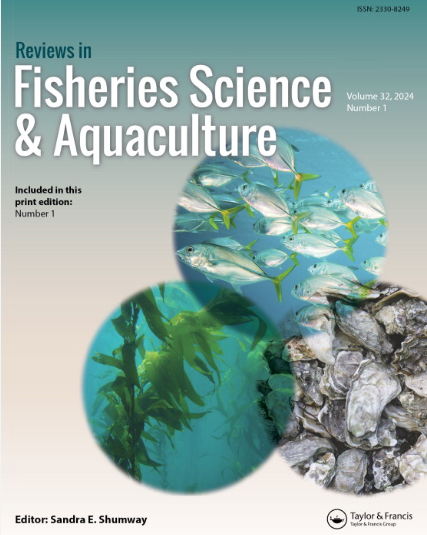通过养分循环和循环经济实现水产养殖的可持续集约化:更多的鱼,更少的废物,蓝色增长
IF 5.3
1区 农林科学
Q1 FISHERIES
引用次数: 35
摘要
水产养殖发展迅速,发挥着重要的经济和社会作用,满足了全球对海产品日益增长的需求。随着水产养殖的加强,寻找更可持续的做法以节约资源和减少浪费的压力越来越大。水产养殖产生的主要废物和副产品在各种养殖类型中进行了量化。废水处理和副产品回收的主要机会包括通过生物过滤器、生物积累和多营养系统的组合进行养分循环。为了支持水产养殖的可持续集约化,需要进一步研究改进副产品的收获、积累和加工方法。同样,从副产品中产生的能源有可能通过陆基循环水产养殖系统支持集约化生产。侧流再利用面临的未来挑战包括食品安全控制和获得消费者认可。从饲养方法到产品储存,在整个水产养殖部门提高资源利用效率的同时,营养物质回收可以使水产养殖在未来一个世纪为数十亿人的营养需求做出可持续的贡献。本文章由计算机程序翻译,如有差异,请以英文原文为准。
Sustainable Intensification of Aquaculture through Nutrient Recycling and Circular Economies: More Fish, Less Waste, Blue Growth
Abstract Aquaculture has grown rapidly to play a crucial economic and social role and meet the increasing global demand for seafood. As aquaculture intensifies, there is increasing pressure to find more sustainable practices that save resources and reduce waste. Major wastes and by-products from aquaculture were quantified across a full range of farming types. Key opportunities for wastewater treatment and by-product recovery include nutrient recycling through a combination of biofilters, bioaccumulation and multitrophic systems. To support a sustainable intensification of aquaculture, improvements in by-product harvesting, accumulation and processing methods require further investigation. Likewise, energy generated from by-products can potentially support intensified production through land-based recirculating aquaculture systems (RAS). Future challenges faced by the reuse of side streams include control of food safety and gaining consumer acceptance. Combined with increases in resource use efficiency across the aquaculture sector, from feeding methodologies to product storage, nutrient recycling can enable aquaculture to contribute sustainably toward the nutritional requirements of billions of people over the next century.
求助全文
通过发布文献求助,成功后即可免费获取论文全文。
去求助
来源期刊

Reviews in Fisheries Science & Aquaculture
FISHERIES-
CiteScore
25.20
自引率
0.90%
发文量
19
期刊介绍:
Reviews in Fisheries Science & Aquaculture provides an important forum for the publication of up-to-date reviews covering a broad range of subject areas including management, aquaculture, taxonomy, behavior, stock identification, genetics, nutrition, and physiology. Issues concerning finfish and aquatic invertebrates prized for their economic or recreational importance, their value as indicators of environmental health, or their natural beauty are addressed. An important resource that keeps you apprised of the latest changes in the field, each issue of Reviews in Fisheries Science & Aquaculture presents useful information to fisheries and aquaculture scientists in academia, state and federal natural resources agencies, and the private sector.
 求助内容:
求助内容: 应助结果提醒方式:
应助结果提醒方式:


